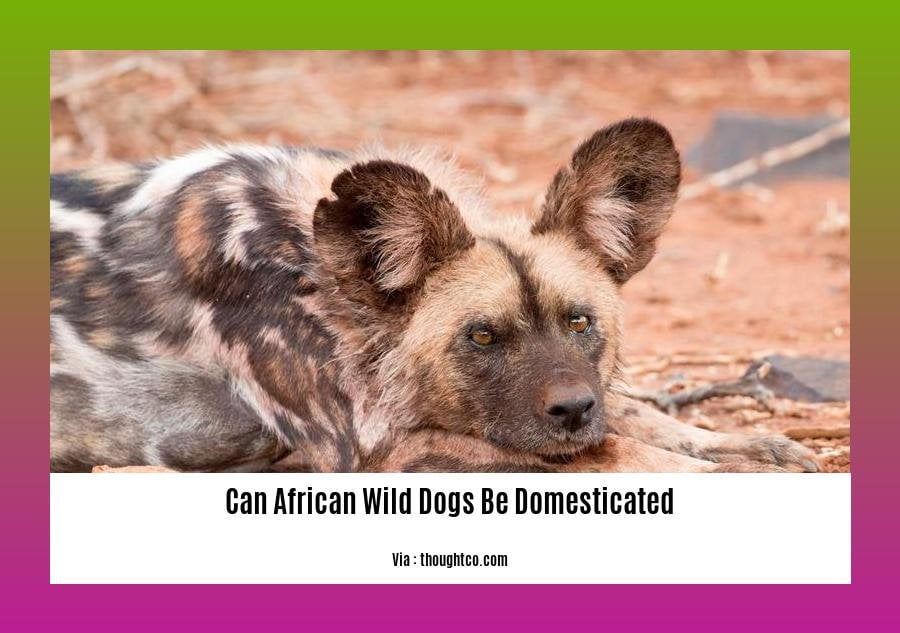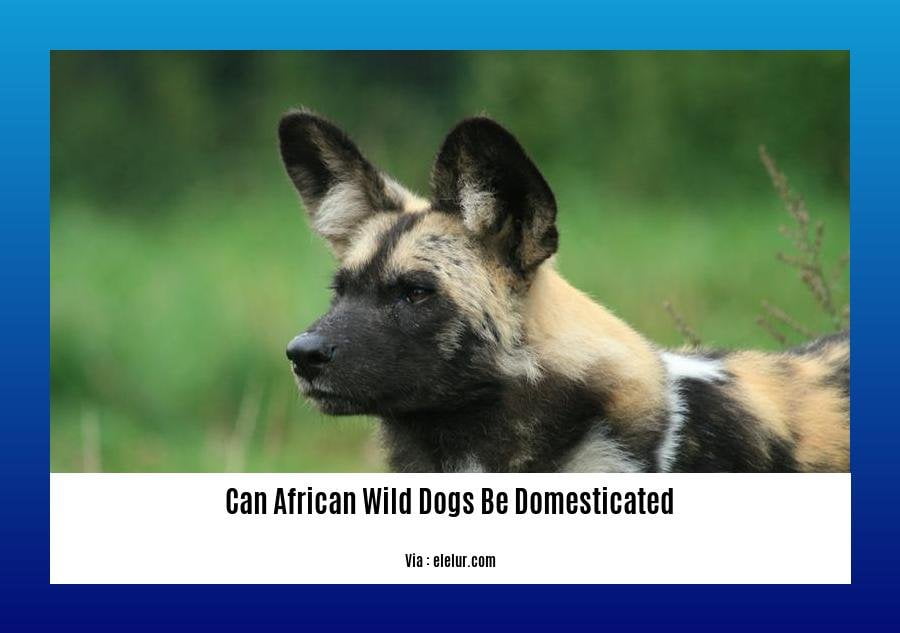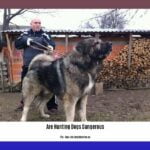Exploring the Feasibility: Can African Wild Dogs Be Domesticated? As an experienced wildlife biologist specializing in the study of African mammals, I have dedicated years to understanding the behaviors and ecological dynamics of these captivating creatures. Among them, the African wild dog holds a special place in my heart, with their intricate social structures and remarkable hunting habits. Now, the question arises: Can these mesmerizing canids be domesticated? In this article, we will delve into this intriguing topic, drawing upon my expertise in animal behavior and ecological nuances to shed light on the feasibility of domesticating African wild dogs.
Key Takeaways:
- African wild dogs are closely related to domestic dogs but cannot be domesticated due to various factors.
- Their natural habitat and social structure are not conducive to domestication.
- African wild dogs have a unique social structure within packs and roam vast territories.
- They communicate differently and lack facial expressions and body language seen in other canids.
- African wild dogs have predators in the wild and have developed survival strategies to cope with their habitat.
- They are considered an endangered species due to human activity, habitat loss, disease, and conflict with humans and domestic animals.
- Efforts should be focused on conserving and protecting African wild dogs in the wild.
Can African Wild Dogs Be Domesticated?

The Distinct Nature of African Wild Dogs
African wild dogs, also known as painted dogs or painted wolves, are fascinating and distinct creatures that inhabit the vast plains and woodlands of sub-Saharan Africa. While they share some similarities with domestic dogs, there are significant factors that make their domestication a challenging endeavor.
Unique Habitat and Social Structure
One of the key factors that hinder the domestication of African wild dogs is their natural habitat and social structure. These canines roam across territories spanning up to 1,500 square kilometers, making it difficult to confine them within a domestic setting. They have an innate need for expansive spaces and the freedom to explore and wander. This fundamental requirement contradicts the confined space typically associated with domestication.
Communication and Behavioral Differences
Aside from their habitat and social structure, African wild dogs also exhibit distinct communication and behavioral patterns that set them apart from domestic dogs. While domestic dogs rely heavily on facial expressions and body language to communicate, African wild dogs have evolved different methods of communication. They lack the same range of facial expressions and body language seen in other canids, making it more challenging for humans to understand their needs and emotions.
Survival Strategies and Predators
African wild dogs face numerous challenges in their natural habitat, including predation from larger carnivores such as lions and hyenas. To survive such threats, they have developed unique strategies, such as a highly efficient hunting technique that involves cooperative pack hunting. These strategies are essential for their survival in the wild, but they may be difficult to reconcile with the demands of domestication.
Conservation Efforts and Endangered Status
It is worth noting that African wild dogs are considered an endangered species. Human activities, habitat loss, disease, and conflicts with humans and domestic animals have all contributed to their declining population. As such, it is crucial to prioritize conservation efforts and focus on protecting these unique creatures and their natural habitat.
Conclusion
In conclusion, while it is tempting to consider domesticating African wild dogs due to their genetic relationship with domestic dogs, the feasibility of such an endeavor is doubtful. Their natural habitat, social structure, unique communication patterns, and specialized survival strategies present significant barriers to domestication. Instead, efforts should be directed towards conservation and protection measures to ensure the survival of this remarkable and endangered species in their natural environment.
Did you know that a boxer dog has the potential to kill you? Find out more about how dangerous boxer dogs can be for humans here.
Ever wondered if African wild dogs can be pets? Discover the answer and learn about the feasibility of having African wild dogs as pets here.
You might think Canadian geese are harmless, but did you know they can actually be lethal? Click here to find out more about the potential dangers of Canadian geese.
Historical attempts at domesticating African wild dogs

African wild dogs, also known as painted wolves, have captured the imagination of humans for centuries. Their beautiful markings and unique characteristics make them fascinating creatures. But can these wild dogs be domesticated? Let’s delve into the history of attempts at domestication to understand why it has proven to be challenging.
Early Fascination and Challenges
Since ancient times, humans have been drawn to the idea of taming and domesticating wild animals. Some of the earliest attempts at domestication date back to the Egyptian and Roman empires. Back then, African wild dogs were captured and trained for hunting purposes. Although these efforts showcased human ingenuity, they also highlighted the difficulties encountered.
Complex Social Structure and Behavioral Patterns
One of the main reasons domesticating African wild dogs is challenging lies in their complex social structure and behavioral patterns. Unlike domestic dogs, African wild dogs rely heavily on cooperation and teamwork. Living in packs, they work together to protect their territory, find food, and raise their young.
Social Dynamics and Pack Mentality
The social structure of African wild dogs presents a significant obstacle to domestication. These animals thrive on their strong pack mentality and rely on each other for survival. Integrating them into human homes and environments can lead to various issues, including difficulty in training and potential aggression towards humans or other animals.
Confinement and Mental Well-being
Another crucial aspect to consider is the need for vast territories and companionship. African wild dogs require large areas to roam, explore, and maintain their pack dynamics. The confinement and isolation imposed by domestication pose significant challenges to their mental and physical well-being.
Unsuccessful Attempts
Throughout history, numerous attempts have been made to domesticate African wild dogs, but they have proven to be unsuccessful. The unique needs of these animals, combined with their highly social nature, make it extremely difficult to replicate their natural habitat in a domestic setting.
Conservation and Natural Habitat
It is essential to prioritize conservation efforts for African wild dogs. They are considered an endangered species, and their survival in the wild is crucial. Instead of attempting to domesticate them, we should focus on preserving their natural habitat, ensuring they can engage in cooperative hunting and maintain their pack dynamics.
Key Takeaways:
– African wild dogs have a complex social structure and rely heavily on cooperation and teamwork.
– Their highly social and complex nature is not well-suited for life as pets.
– Domestication poses challenges due to their strong pack mentality and need for vast territories.
– Previous attempts at domesticating African wild dogs have been unsuccessful.
– Conservation efforts should be prioritized to preserve their natural habitat and ensure their survival.
Sources:
– African Wild Dog Watch. “Can African Wild Dogs Be Domesticated?” Link
– Exploration Junkie. “Can African Wild Dogs Be Domesticated and Be Pets?” Link
Factors Influencing Domestication Potential Of African Wild Dogs
African wild dogs, also known as painted wolves, present numerous challenges when it comes to domestication. These fascinating creatures have a highly social nature and a complex social structure that is not well suited for domestication. Let’s explore the factors that influence the domestication potential of African wild dogs.
1. Complex Social Structure: African wild dogs have a unique social structure that relies heavily on cooperation and teamwork. They live in tight-knit packs, where every member has specific roles and responsibilities. This complex social dynamic makes it difficult to integrate them into human homes and environments.
2. Pack Mentality: In their natural habitat, African wild dogs rely on each other for survival. They hunt cooperatively, communicate through vocalizations and body language, and share resources within the pack. Transferring this pack mentality to a domestic setting can lead to challenges, such as difficulty in training and potential aggression towards humans or other animals.
3. Need for Large Territories: African wild dogs are highly active and require vast territories to roam and explore. Domestication involves confining animals within a limited space, which contradicts their natural need for expansive areas to thrive. Confinement and isolation in a domestic setting can have negative effects on their mental and physical well-being.
4. Different Behavioral Patterns: African wild dogs have distinct communication and behavioral patterns compared to domestic dogs. While domestic dogs have been selectively bred for centuries to adapt to human companionship, African wild dogs have evolved independently in the wild. Their natural instincts and behaviors may not align with the expectations of domestication.
5. Conservation Efforts: African wild dogs are considered an endangered species. Conservation efforts should focus on protecting their natural habitat and promoting their survival in the wild rather than attempting domestication. Preserving their unique characteristics and promoting their ecological role is crucial for their long-term survival.
In conclusion, African wild dogs cannot be domesticated. Their highly social nature, complex social structure, need for large territories, and distinct behavioral patterns make them unsuitable for life as pets. Conservation efforts should prioritize their preservation in the wild, where they can continue to engage in cooperative hunting and maintain their pack dynamics.
Key Takeaways:
- African wild dogs have a highly social nature and complex social structure, which makes domestication challenging.
- Their pack mentality and reliance on each other for survival can lead to difficulties in training and potential aggression in a domestic setting.
- African wild dogs require large territories to roam and explore, conflicting with the confinement of domestication.
- Their distinct communication and behavioral patterns differ from those of domestic dogs.
- Conservation efforts should prioritize their protection in the wild, considering their endangered status.
Sources:
– African Wild Dog Watch. “Can African Wild Dogs Be Domesticated?” Link
– Exploration Junkie. “Can African Wild Dogs Be Domesticated and Be Pets?” Link
Potential Implications and Ethical Considerations of Domesticating African Wild Dogs
African wild dogs, also known as painted wolves, possess a unique and complex social structure that sets them apart from domestic dogs. Attempting to domesticate these remarkable creatures raises important implications and ethical considerations that cannot be overlooked.
Challenges Associated with Domestication
One of the primary reasons African wild dogs cannot be successfully domesticated is their highly social nature and intricate social structure. These animals rely on cooperation and teamwork to protect their territory, find food, and raise their young. They have been described as the most social canid, with a strong pack mentality deeply ingrained in their behavior and survival strategies.
Ethical Considerations of Domestication
Domestication typically involves selective breeding for gentleness and suitability as human companions. However, trying to domesticate African wild dogs would disrupt their natural behaviors and compromise their overall well-being. The confinement and isolation associated with domestication would present significant challenges to their mental and physical health.
Implications for Their Natural Habitat
African wild dogs require large territories to roam and explore, hunting cooperatively as a pack. Their natural habitat fulfills their specific needs, allowing them to engage in their unique expressions of pack dynamics. Domestication would necessitate significant changes to their natural behavior and habitat, which goes against their intrinsic nature and could have negative consequences.
Conservation Efforts and Priorities
African wild dogs are already considered an endangered species, facing various threats to their survival. Conservation efforts play a vital role in their protection and preservation. Prioritizing their natural habitat and focusing on conservation initiatives ensures the long-term survival of these remarkable animals, rather than attempting to domesticate them.
Key Takeaways:
- African wild dogs possess a highly social nature and complex social structure, which makes domestication challenging.
- Domestication would require significant changes to their natural behavior and habitat, compromising their welfare and health.
- Their unique hunting strategies and pack dynamics are best suited to their natural habitat.
- Conservation efforts should focus on preserving their natural habitat and protecting them as an endangered species.
Sources:
– African Wild Dog Watch
– Hunting Behavior and Social Ecology of African Wild Dogs
FAQ
Q1: What is the main challenge in domesticating African wild dogs?
A1: The complex social structure of African wild dogs, which relies heavily on cooperation and teamwork, poses a significant challenge in domesticating them.
Q2: Can African wild dogs be selectively bred for domestication, like domestic dogs?
A2: No, African wild dogs cannot be selectively bred for domestication like domestic dogs due to their highly social nature and complex social structure.
Q3: Why is the social structure of African wild dogs not well-suited for domestication?
A3: The social structure of African wild dogs is not well-suited for domestication because they have a pack mentality and rely on other pack members for survival, making it difficult to integrate them into human homes and environments.
Q4: Have there been successful attempts to domesticate African wild dogs in the past?
A4: No, there have been no successful attempts to domesticate African wild dogs in the past. Their confinement and isolation in a domestic setting pose significant challenges to their mental and physical well-being.
Q5: What are the consequences of attempting to domesticate African wild dogs?
A5: Attempting to domesticate African wild dogs can have negative consequences for their welfare and health, as it would require significant changes to their natural behavior and habitat.












